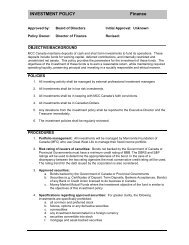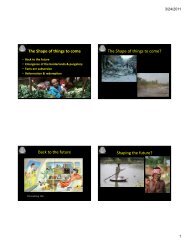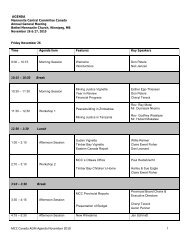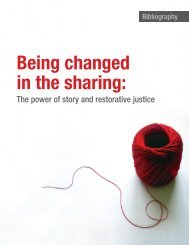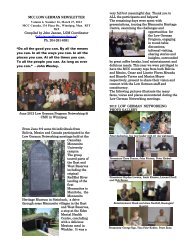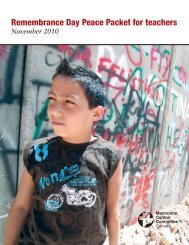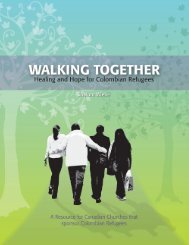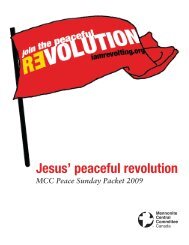to download PDF - Mennonite Central Committee Canada
to download PDF - Mennonite Central Committee Canada
to download PDF - Mennonite Central Committee Canada
You also want an ePaper? Increase the reach of your titles
YUMPU automatically turns print PDFs into web optimized ePapers that Google loves.
Finding s<strong>to</strong>riesSome people in our churcheshave firsthand experiences relating<strong>to</strong> World War II, orresistance <strong>to</strong> Vietnam, war taxresistance, or other forms ofconscientious objection. Othersmay know of s<strong>to</strong>ries passed on in their families. APeace Sunday theme of conscientious objection <strong>to</strong>war can provide the opportunity <strong>to</strong> find and recordthese CO experiences.Sample interview with Vietnam draftresister Monte CorwinAs a Christian, why is it important for <strong>to</strong> rememberthe s<strong>to</strong>ries of those who were conscientiousobjec<strong>to</strong>rs in the past?Remembering conscientious objec<strong>to</strong>rs in the pastprovides a legacy of religious objection <strong>to</strong> warfarethat present and future COs can draw on for support,instruction, and advisement when faced withsimilar decisions of conscience. This Christian heritageof objection <strong>to</strong> war in all forms thus becomesthe foundation, the common bond of reference forone and all. It provides <strong>to</strong>day’s COs with an his<strong>to</strong>ricalprecedent for discernment and decision-makingif faced with imminent induction in<strong>to</strong> the “involuntaryservitude” of military service.Throughout his<strong>to</strong>ry, our forbearers were seen asradical, in part, because of their faith convictionsabout pacifism. Do you think <strong>Mennonite</strong>s are seenas radical <strong>to</strong>day?Within the broad Christian community, I believethat most would see <strong>Mennonite</strong>s as sturdy godlyfolk, radical in their sense of reaching out andbeing ever ready <strong>to</strong> help those in need. Today, theirtraditional peace witness would be generallyknown but not seen so much as radical, as perhapsduring the past World Wars. Today, there are anumber of peace groups, both religious and secularand (especially in <strong>Canada</strong>) “untested” by anational conscription, as in these two previouswars.How does our Christian faith require us <strong>to</strong> be radicalpeace witnesses?For me, <strong>to</strong> assume a peace witness seems necessary,fitting, and proper, based upon my understandingof Scripture—as gleaned from the “good news” ofthe New Testament. My conviction of the Lord’sintention for worldwide peace, brotherhood, andjustice is so central and elemental in my soul, mycore of being, as <strong>to</strong> be ineffable <strong>to</strong> written expression.Suffice it <strong>to</strong> say that a peace witness “should”be essential <strong>to</strong> a proper faith perspective within anyChristian faith-based organization. Hopefully, mylife will be lived out as a personal reflection of thatconviction, that core belief.His<strong>to</strong>rical <strong>Mennonite</strong> faith imperatives should berevisited and re-evaluated as the challenges of<strong>to</strong>day are measured against those of the past. Thatis why it is so important <strong>to</strong> remember the s<strong>to</strong>ries ofthose who were contentious objec<strong>to</strong>rs in the past.May their experiences help <strong>to</strong> guide those who“contentiously object” <strong>to</strong> participation in any curren<strong>to</strong>r future state-organized act of warfare, ornational aggression.Interview a WWII COsThe voices of the WWII COs are quieting as timemoves along. We do not have <strong>to</strong>o many years leftin which we can hear their s<strong>to</strong>ries firsthand, so it isimportant <strong>to</strong> record their wisdom now.Prepare for the interview:Have good recording equipment and extra tapesand batteries. It is best <strong>to</strong> use clip-on microphonesand <strong>to</strong> sit close <strong>to</strong>gether. Test your equipment andknow its capabilities.Know your <strong>to</strong>pic. It would be helpful <strong>to</strong> do a bit ofbackground research (e.g. That There Be Peace byLawrence Klippenstein, or Chapter 2 in<strong>Mennonite</strong>s in <strong>Canada</strong>, Volume 3, by Ted Regehr).Not all COs worked in the forestry camps. Someworked on farms, some in industry, some in hospitals,some in northern native communities.Ask open-ended questions and try <strong>to</strong> draw out theunique aspects of the s<strong>to</strong>ry.Sample questions:1. Personal backgroundName, parents, where lived, church affiliation.2. War is declaredHow did it impact you?When you found out you might be called up forservice, what went through your mind?How did you decide not <strong>to</strong> join the military andopt for Alternative Service?Were there people you looked <strong>to</strong> for advice?Was there tension between you (or other COs) andpeople who were joining the military or had friendsor family in active service?41



